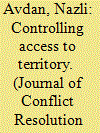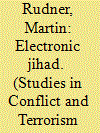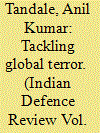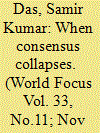| Srl | Item |
| 1 |
ID:
124535


|
|
|
|
|
| Publication |
2013.
|
| Summary/Abstract |
This study examines Al Qaeda's organizational dynamics, doctrinal precepts, strategic objectives, operational priorities, and tactical vectors in the context of its Twenty-Year Strategic Plan. This seven-stage Strategic Plan is addressed with a particular focus on its current phase (Stage 5), 2013-2016, involving the mobilization of Muslim forces for the "Declaration of the Caliphate." In this regard, particular attention is paid to the Al Qaeda engagement in militant jihadist campaigns across the Middle East and other Muslim domains. The study concludes with an overall assessment of global threats and ongoing risks arising from the current phase of Al Qaeda's Twenty-Year Strategic Plan.
|
|
|
|
|
|
|
|
|
|
|
|
|
|
|
|
| 2 |
ID:
132321


|
|
|
|
|
| Publication |
2014.
|
| Summary/Abstract |
Previous scholarship has largely failed to address the effect of economic interdependence on issue areas other than interstate conflict. This study seeks to redress this lacuna by focusing on states' visa policies and examining the impact of trade and capital interdependence in the context of transnational terrorism. The article argues that economic ties affect visa policies through a reconfiguration of preferences and the opportunity costs of economic loss and by tempering the impact of terrorism. To support this claim, the study conducts statistical analysis using directed dyad data on the visa policies of 207 states and independent political units. The article shows that the impact of economic interdependence is contingent on whether states are directly targeted in attacks of terrorism or face indirect threats from global terror. The study finds that economic incentives overwhelm security concerns when threats are indirect but have relatively limited influence, given threats against a state's own citizens or territory.
|
|
|
|
|
|
|
|
|
|
|
|
|
|
|
|
| 3 |
ID:
156145


|
|
|
|
|
| Summary/Abstract |
The Internet has emerged as a key technology for Al Qaeda and other jihadist movements waging their so-called electronic jihad across the Middle East and globally, with digital multiplier effects. This study will examine the evolving doctrine of “electronic jihad” and its impact on the radicalization of Muslims in Western diaspora communities The study describes Internet-based websites that served as online libraries and repositories for jihadist literature, as platforms for extremist preachers and as forums for radical discourse. Furthermore, the study will then detail how Internet connectivity has come to play a more direct operational role for jihadi terrorist-related purposes, most notably for inciting prospective cadres to action; for recruiting jihadist operatives and fighters; for providing virtual training in tactical methods and manufacture of explosives; for terrorism financing; and for actual planning and preparations for specific terror attacks. Whereas contemporary jihadist militants may be shifting from the World Wide Web to social media, such as Facebook, YouTube, and Twitter for messaging and communications, nevertheless the Internet-based electronic jihad remains a significant catalyst for promoting jihadist activism and for facilitating terrorist operations.
|
|
|
|
|
|
|
|
|
|
|
|
|
|
|
|
| 4 |
ID:
135600


|
|
|
|
|
| Publication |
DelhI, Neha Publishers and Distributors, 2015.
|
| Description |
288p.Hbk
|
| Standard Number |
9789380318639
|
|
|
|
|
|
|
|
|
|
|
|
Copies: C:1/I:0,R:0,Q:0
Circulation
| Accession# | Call# | Current Location | Status | Policy | Location |
| 058047 | 303.625/LOH 058047 | Main | On Shelf | General | |
|
|
|
|
| 5 |
ID:
146576


|
|
|
|
|
| Contents |
The states which are nurturing and nursing terrorists must be held responsible for the conduct of non-state actors because they operate from within the territorial boundaries of the host country. Every state is bound to respect the sovereignty of other countries, and hence these states cannot avoid its liability by any excuses. India’s vital interests can be better served by invoking the expanded doctrine of offensive self-defence, which has witnessed a normative evolution, particularly in relation to non-state actor, following the events of September 11, 2001. This expanded doctrine, has also gained acceptance of the Western power and scholars which permit the victim states to use force against non-state actors and breach the territorial sovereignty of foreign states in response to an accumulation of terrorist attacks.
|
|
|
|
|
|
|
|
|
|
|
|
|
|
|
|
| 6 |
ID:
116036


|
|
|